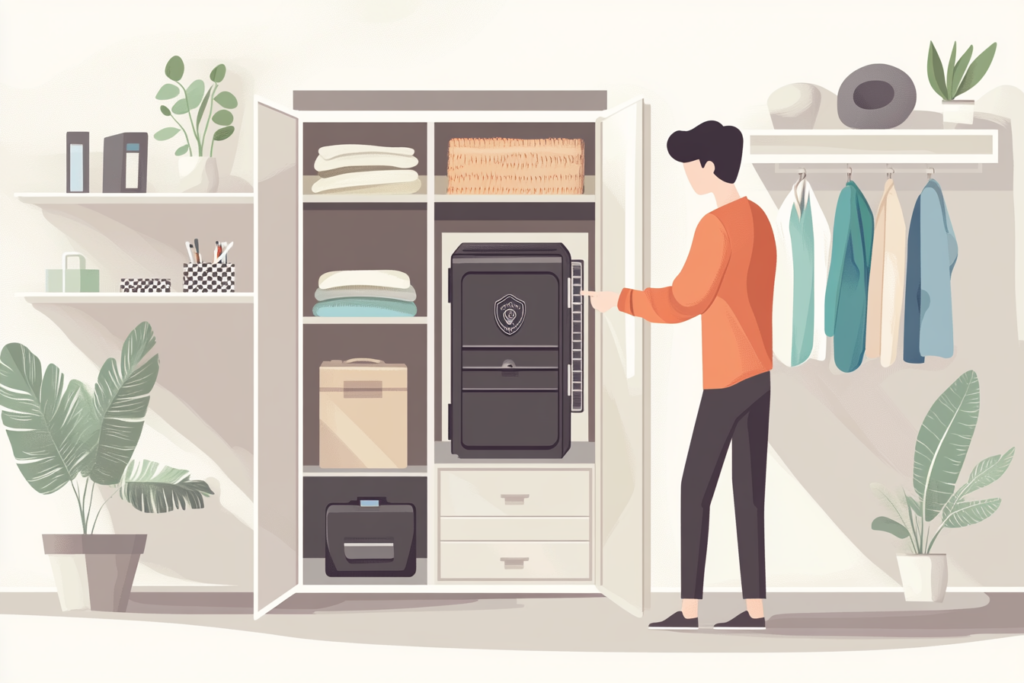A home safe is more than just a big metal box—it’s an invaluable safeguard for protecting your valuables, important documents, and irreplaceable items. Whether it’s shielding your belongings from theft, fire, or natural disasters, investing in a home safe provides security, peace of mind, and long-term value. Keep reading to learn more about why purchasing a home safe makes sense and what to consider before purchasing one.
Protect Valuables from Theft
One of the most obvious reasons homeowners invest in a home safe is to defend their valuables against burglary. While home security systems are excellent deterrents, safes add an additional layer of protection. Burglars often target easily accessible items like cash, jewelry, or electronics. A properly installed and concealed safe makes it much harder for thieves to access your valuables. Did you know that a home burglary happens less than every 30 seconds in the U.S.?
- Burglars typically spend only 8–12 minutes in a home, so a well-hidden safe reduces the likelihood of major loss.
- Modern safes come with advanced locking mechanisms, including biometric or digital locks, making unauthorized access nearly impossible.
- Small, portable safes can be bolted down to prevent them from being removed entirely.
Fire and Water Protection
Natural disasters like fires, floods, and storms can destroy homes and the valuables within them in record time. A fireproof and waterproof safe protects irreplaceable documents and items, even in extreme conditions.
- Fireproof safes can withstand temperatures up to 1,700°F for one to two hours, enough time for firefighters to extinguish a blaze.
- Waterproof safes keep contents dry in the event of floods or leaks.
- Storing items like birth certificates, wills, deeds, and family heirlooms ensures they remain safe.
Secure Important Documents
Certain documents are extremely difficult or impossible to replace, and losing them can cause significant stress or financial trouble. A home safe keeps these papers organized, protected, and accessible only to you.
- Examples include passports, Social Security cards, and medical records.
- Home safes are also ideal for safeguarding tax returns, insurance policies, and other legal documents.
- Storing hard-to-replace documents in a safe reduces reliance on external storage solutions, such as safe deposit boxes, which may not always be convenient.
Safeguard Digital Media
In today’s digital age, many valuables are stored on electronic devices. A home safe can protect USB drives, external hard drives, and other data storage devices from theft and environmental damage. Look for safes specifically designed to protect electronics to ensure temperature and humidity control.
Prevent Unauthorized Access to Firearms
For households with firearms, a gun safe is not just a precaution—it’s a responsibility. Preventing unauthorized access to weapons protects family members and reduces the risk of accidents.
- Many states require gun owners to store firearms securely.
- Gun safes are designed to accommodate various sizes of firearms, from handguns to rifles.
- Safes with quick-access locks provide security without sacrificing readiness in emergencies.
Preserve Sentimental Items

For example, some items hold value beyond money—family heirlooms, photographs, or letters. A home safe ensures these sentimental belongings are kept safe from harm while remaining accessible when you want to revisit them.
- Fireproof safes protect fragile items like photo albums or letters.
- Memory safes are a thoughtful investment for families wanting to preserve their history.
Discourage Opportunistic Theft
A home safe can discourage opportunistic theft if you frequently have visitors, such as contractors, cleaners, or houseguests. While most people are trustworthy, it’s best to minimize temptation by securely storing valuables.
Reduce Home Insurance Premiums
Many insurance companies offer homeowners discounts who take extra security measures, such as installing a home safe. While savings vary by provider, securing high-value items in a safe can lower premiums for personal property coverage.
- Discuss potential discounts with your insurance provider.
- Ensure your safe meets the standards required for discounts, such as fireproof ratings or specific locking mechanisms.
Convenience and Accessibility
Unlike safe deposit boxes, home safes provide immediate access to your valuables whenever you need them. This convenience is especially important for documents or items required in emergencies, such as passports or medical records.
Factors to Consider When Choosing a Safe
To maximize the benefits of investing in a home safe, choosing one that meets your specific needs is important. Here are key factors to consider:
- Size and Capacity: Determine what you plan to store and choose a safe with adequate space. Safes come in several different options, from compact models for small items to large ones for storing firearms or extensive collections of valuables.
- Fire and Waterproof Ratings: Look for certifications from independent organizations, such as UL (Underwriters Laboratories), that test safes for fire resistance and water protection.
- Locking Mechanisms: Choose between traditional key locks, combination locks, digital keypads, or biometric locks. Digital and biometric options provide quicker access but may require batteries.
- Installation: Figure out if you want a portable safe, a wall-mounted model, or a floor safe. Bolting your safe in place adds an extra layer of security.
- Price: Safes vary widely in price, ranging from $50 for basic models to thousands of dollars for advanced, large-capacity safes. Consider your budget alongside your security needs.
Maintenance and Care
To ensure your safe continues to perform as intended, follow these maintenance tips:
- Test digital or biometric locks regularly to ensure they function correctly.
- Replace batteries in electronic locks as recommended by the manufacturer.
- Clean and lubricate mechanical locks to prevent wear and tear.
- Inspect fireproof and waterproof seals for damage, replacing them as needed.
Should you Invest in a Home Safe?
For many homeowners, a home safe is a great way to secure valuables and protect against unforeseen events. The peace of mind it offers, combined with its practical benefits, makes it a worthwhile investment.
Before making any purchases, research and find a safe that matches your budget and needs for long-term protection is important.
You might also be interested in: 9 Steps to Securing Your Home During the Holidays




